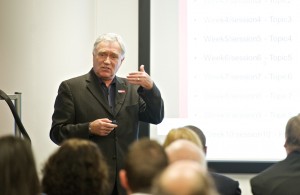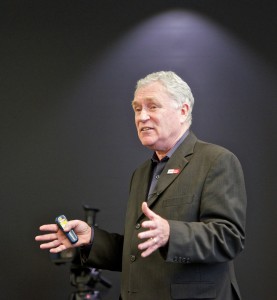
At the moment there is a great opportunity to understand the most recent and, indeed, all financial crises. That opportunity is provided by the release of two films, both destined for Oscar nominations, – The Wolf of Wall Street and American Hustle.
The first is a pretty accurate account of the rise and fall of stockbroker Jordan Belfort and the second is a perhaps less accurate but highly enjoyable account of a real life confidence trick. Why should you go? If you’re a real film buff, because they are two great films; if you’re a business management course student or anyone interested in the inner workings of the financial sector, because they both show why and how the finance industry goes wrong.
Black Swan and the financial crisis 2008
What is so important about these films is that they expose the unpleasant truths of high finance – that it’s about gambling and confidence and that to survive the layman has to understand that. Who better to help us navigate our way through this turbulent world than Fat Tony (or Brooklyn Tony), a fictional character created by Nassim Taleb in his best-selling book, The Black Swan?

Black Swan: challenge the self-proclaimed experts
Fat Tony’s role is to constantly challenge the self-proclaimed experts’ predictions with his particular brand of common sense. Taleb describes Fat Tony as follows:
Tony is remarkably gifted at getting unlisted phone numbers, first-class seats on airlines for no additional money, or your car in a garage that is officially full, either through connections or his forceful charm.
Everyone knows a Fat Tony. Fat Tony is the nemesis of the financial ‘experts’ that Taleb encounters within the industry. Fat Tony uses language that we can actually understand and this is important because we tend to separate gambling lexicon from financial lexicon. For example, when asked, “What’s a CDO”? Tony responds that it is, “a collateralised debt obligation”. When further questioned, he elaborates that it is, “a lot of different debts bundled up so that a buyer can’t see the toxic stuff, it’s a bad bet – or a good bet if you’re selling the bundle”.
Black Swan: Good/bad bet – but it’s just a bet
For Tony it’s simple – it might be a good or a bad bet but it’s just a bet. Understanding financial crises is just as simple. Take an hour to read a great little book by JK Galbraith (A Short History of Financial Euphoria) and you will recognise everything he says as so obvious you‘ll wonder how we keep making the same mistakes. One of the biggest problems he identifies is the confidence we have in financial ‘experts’. The problem is, as Nassim Taleb explains in The Black Swan, that,
Certain professionals, while believing they are experts, are in fact not. Based on their empirical record, they do not know more about their subject matter than the general population, but they are much better at narrating, or worse, at smoking you with complicated mathematical models.
Interestingly, Nobel Laureate economist and philosopher Friedrich August von Hayek made the same point in his Nobel Memorial lecture in 1974 and more recent confirmation of this view exists in research carried out by Leavitt and Miles of Chicago University regarding the skills required to be successful at poker. They found that,
…those players categorised as skilled overachieved with a return on their investment of 30% whereas those categorised as ordinary players made a loss of 15.6%. Economists explain that similar tests of persistence returns have also been used to detect whether mutual fund managers had genuine expertise. In contrast to the case of poker, they point out, those tests have tended to find, “little evidence of skill in this domain”.
In reality, these `experts’, as Taleb explains,
dress up the intellectual fraud of forecasting with mathematics.
Fat Tony – a confidence game
However, what these finance professionals are experts in, is how to be confident and how to transmit that confidence. This is why knowledge of the confidence game is so important. When we talk about [Charles] Ponzi schemes, for example, we are talking about the Big Con.
So, what can we learn from the economists, from Fat Tony and from the gamblers or, for that matter, any other smart guys? Here are a few gems to cling to:
- Fat Tony’s motto is – “find who the suckers are”. But beware, “if you can’t spot the sucker in the room, then it’s you.”
- Freidrich Hayek says, “I prefer true but imperfect knowledge, even if it leaves much indetermined and unpredictable, to a pretence of exact knowledge that is likely to be false.” Nobel Memorial lecture, 1974
- Robert Shiller, Nobel Laureate: “Rational economic theory fails to take into account the roles of confidence, stories and snake oil in economic fluctuation.”
- David Maurer, The Big Con, 1940: “You can’t cheat an honest man.”
- David Mamet, playwright: “The poker player learns that sometimes both science and common sense are wrong; that the bumblebee can fly; that, perhaps, one should never trust an expert; that there are more things in heaven and earth than are dreamt of by those with an academic bent.”
- VP Pappy, a legendary Detroit gambler: “If you ain’t just a little scared when you enter a casino, you are either very rich or you haven’t studied the games enough.”
- Ambrose Bierce, The Devil’s Dictionary (1906): “The gambling known as business looks with severe disfavour on the business known as gambling.”
Black Swan lessons from Fat Tony

Let me finish with a quote from Canadian economist John Kenneth Galbraith that represents our best way forward:
When there is a claim of unique opportunity based on special foresight [by self-ascribed geniuses], all sensible people should circle the wagons; it is time for caution.
So, what is my solution to the problem of financial crises? To be honest, I don’t think there is an absolute solution. However, not trusting the ‘experts’ to gamble with YOUR money, simplifying the language of finance to replicate the language of gambling (which is what it is) and watching the fiction in movies to understand real truth will all help. What do I really think? Stand by for the next banking scandal, financial fraud, rogue trader – it won’t be long.
Some films to watch:
- Gambling
- Rounders
- The Cincinatti Kid
- Confidence
- House of Games
- American Hustle
- Matchstick men
- Elmer Gantry
- Finance
- Boiler Room
- Wolf of Wall Street
- Other People’s Money
- Documentaries
- Smartest Guys in the Room
- Inside Job
As any film buff will tell you, there are many, many more. Please send any suggestions for other films to: c.brady@salford.ac.uk and use the comments section below to share your thoughts!